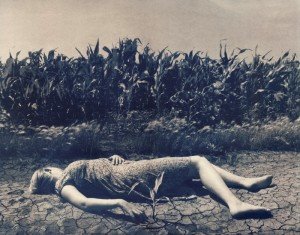GRINGO by Brandon Courtney
Wetback. Fence-jumper. My father’s heart fists
with its yearly dying as he recalls his hired hand—
a Hispanic—burying
our tractor to its axle in a soup of snowmelt
to men who, every morning,
sit half-mooned around the greasy spoon’s table,
lifting Styrofoam cups to sunburnt lips:
hardscrabble farmers—chassis grease
gloving their hands, prove rumors
of neighbors’ gone
belly-up, face down, neighbors fenced-in
by stars. And I’m ten years old, impossibly here,
spit and image of men I’m warned to call sir,
men who’ve bottle-fed
my younger sister as tenderly as their own
daughters and they’re cursing, cursing.
It’s goddamn the weather, goddamn the busted baler,
goddamn the combine’s clutch chewed to shit
then one of the men says I would have shot
the little beaner right where he stood.
Everyone laughs.
I laugh too, although I don’t
know what spick means, beaner,
only that my father is coughing, which means
one more year, two if he’s golden,
which is nothing
to cemetery soil, the patience of the open grave.
The others stay, careless in conversation,
as if their voices were enough
to keep their small, Sunday god
from deafness. Years later, I’d land summer work
at Iowa Beef Packers pressure washing
gore from stalls, as undocumented men worked
blades, quick as flies, on the bloodletting line.
When I ask Eduardo how, lace-deep in rarefied blood,
he could open the soft machines
of bulls with a razor knife, cut away flesh
easy as a winter jacket, he presses his thumb
and index finger together like locust wings
and rubs, which means money,
which means everything.
Not surprising when Eduardo
says his younger sister, unable to speak a lick
of English, would show me her naked chest
for twenty dollars after work,
says she’d already lifted her skirt
for half the slaughterhouse
gringos. She, dressed like a Salvation
Army mannequin, led me behind the dumpsters,
unsnapped a dozen iridescent buttons,
and it was done—that fast.
Afterwards only the graceless,
shopworn cups eclipsed her breasts
that, just moments before, I’d admired
as slow fire, as her necessity’s waning gift.
She’ll never know how I once opened a book
of poems over my father’s headstone
in the blue hour and began to read the words
which sounded more like a prayer
than any prayer, as soil’s sickening
labor turned his body
deftly as erratic stone, his blood greening
blades of cemetery fescue.

Brandon Courtney’s work is paired with Emma Powell‘s photographs, “Spanish Moss” (above) and “Volunteer Corn” (below). The poet explains that he wanted “Gringo” to appear with these photographs because they embody “the surrealist, quietly violent nature of a rural setting.”

